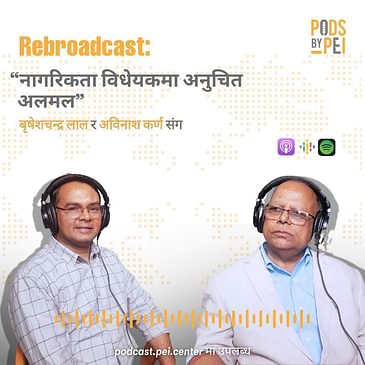Ep#111 नेपालको संविधान जारी भएको नौ वर्ष पूरा भएको उपलक्ष्यमा पोड्स बाई पि.ई.आई.को आजको भागमा पी. ई. आई.का अविनाश कर्ण र तराई–मधेश लोकतान्त्रिक पार्टीका अध्यक्ष बृषेशचन्द्र लालबीच चैत्र २०, २०७९ मा कान्तिपुरमा प्रकाशित उहाँको लेख “नागरिकता विधेयकमा अनुचित अलमल” को सेरोफेरोमा रहेको संवाद पुन: प्रसारण गर्दै छौ| यस लेखमा अध्यक्ष लालले संविधानका शर्त पूरा गरी पारित भएको नेपाल नागरिकता (पहिलो संशोधन) विधेयक–२०७९ लाई कानुन बनिसकेको घोषणा गर्नुपर्ने र लोकतन्त्रवादी भनाउने राजनीतिक दलहरू, र समुहहरुले वर्षौंदेखि नागरिकतालाई राजनीतिक मुद्दाका रूपमा प्रयोग गर्दै सत्ता समीकरण बनाउने र नेतृत्वमा बसिरहन बिनाआधारको सिटबन्धन मात्र तिनका निमित्त पहिलो चासोको विषय रहेको भन्ने विचार र नागरिकता संग सम्बन्धित अन्तरवस्तुमा रहेर कुराकानी गरिएको छ| If you liked the episode, hear more from us through our free newsletter services, PEI Substack: Of Policies and Politics ( https://policyentre.substack.com/welcome ), and click here ( https://patreon.com/podsbypei ) to support us on Patreon!!




